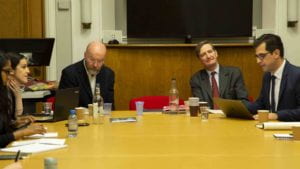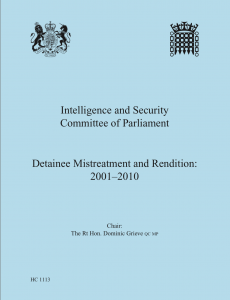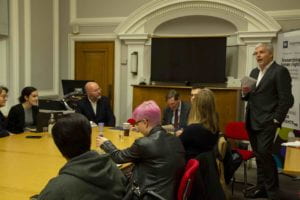
On December 6, 18.00 – 19.45, Goldsmiths Law organised the first in a series of research events that will explore UK compliance with the prohibition against torture.
The event investigated the Intelligence and Security Committee’s (ISC) reports on detainee mistreatment and rendition after 9/11, and we had the unique opportunity to hear from the chair of the Committee, and former Attorney General, the Rt Hon Dominic Grieve QC MP, Dr Natasa Mavronicola (Birmingham Law School) and one of the UK’s foremost investigative reporters, including at the Guardian, Ian Cobain. Goldsmiths’ Pro-Warden for Research, Prof David Oswell, introduced the event, highlighting the Law programme’s ambition to tackle challenging human rights issues. Goldsmiths’ Professor in Law, Dimitrios Giannoulopoulos, chaired the event.

The ISC reports on ‘detainee mistreatment and rendition’ after 9/11, published in June 2018, paint a bleak picture of UK complicity in torture, cruel, degrading and inhumane treatment undertaken by the US intelligence services after the September 11thattacks, and raise serious concern about UK commitment to respecting the absolute right against torture.
Dominic Grieve offered an overview of the report, highlighting that the UK government tolerated action, and took other, that the Committee regarded as “inexcusable”. “The Government is embarrassed” about what is described in the report, he added.
In seeking to contextualise the report’s revelations of the hundreds of incidents of UK complicity in US-ran torture post 9/11, Grieve distinguished between the intelligence services (MI5, MI6, GCHQ) and the military, explaining that military personnel are trained to withstand torture and may be becoming desensitised to it, as a result. Following 9/11, the intelligence services worked with army personnel who had got involved in torture, but were not doing torture themselves, he added.
Grieve also drew a dividing line about what went on until 2010, and what followed, expressing confidence that we now have the protections in place to avoid a similar scandal in the future.
Ian Cobain explained that the ISC reports were a very thorough and candid piece of work, and quite unique in the number of findings of UK complicity in torture it has unearthed. Ian placed the reports in their historic context, drawing on abuses in Kenya, Cyprus and Northern Ireland, with a focus on the adoption of the “five techniques” and the pervasive effect they’ve had upon their victims.
Dr Natasa Mavronicola offered a pessimistic view of the UK’s ability to learn lessons from this history of abuse, analysing torture as an instrument for the dehumanisation of vulnerable groups, minorities, foreigners, an expression of state barbarity towards ‘others’. ‘The ISC Reports confirm and reinforce what many at least suspected to be the widespread, profound and prolonged UK complicity in the torture and rendition practised after 9/11’, she added.

Pro-Warden (Research), Prof David Oswell, opening the seminar on UK complicity in torture
The ISC reports detail the findings of the ISC’s Inquiry into the actions of the UK Agencies and Defence Intelligence in respect of detainees and also rendition. The Committee have taken 50 hours of oral evidence, reviewed 30,000 original documents and a further 10,000 documents which they requested, and 30,000 staff hours have been devoted to this Inquiry.
The Committee reached the point in their Inquiry where they had covered the breadth of the issues but needed to examine certain matters in detail, which could only be done by taking evidence from those who had been on the ground at the time. But restrictions were imposed by the Government which reduced the list of potential witnesses to just four; even those individuals would not be allowed to give evidence on specific cases. The Committee was therefore forced to draw a line under the Inquiry, deciding that what they had found to date should be put into the public domain.
The report brought to light:
- evidence of two cases in which UK personnel were directly involved in detainee mistreatment administered by others;
- evidence of UK officers making verbal threats in nine cases;
- that senior Agency staff had been briefed by the US Agencies and had a clear warning of US treatment of detainees and rendition;
- 13 incidents recorded where it appears that UK personnel witnessed at first hand a detainee being mistreated by others;
- 25 incidents recorded where UK personnel were told by detainees that they had been mistreated by others;
- 128 incidents recorded where Agency officers were told by foreign liaison services (whether formally or informally) about instances of what appears to be detainee mistreatment;
- 232 cases recorded where it appears that UK personnel continued to supply questions or intelligence to liaison services after they knew or suspected (or, in the Committee’s view, should have suspected) that a detainee had been or was being mistreated;
- 198 cases recorded where UK personnel received intelligence from liaison services obtained from detainees whom they knew had been mistreated, or with no indication as to how the detainee had been treated but where, in the Committee’s view, they should have suspected mistreatment;
- three individual cases in which SIS or MI5 made, or offered to make, a financial contribution to others to conduct an extraordinary rendition operation, to countries where there was real risk of torture or cruel, inhuman or degrading treatment of the detainees;
- that the Agencies also suggested, planned or agreed to rendition operations proposed by others in 28 cases.
After publication of the report, there have been calls from across the political spectrum and human rights organisations such as Liberty, Amnesty and Reprieve, for a “full blown” judge-led investigation into British involvement in extraordinary rendition and torture.
The Foreign Office minister Alan Duncan subsequently told Parliament that the government would decide within 60 days whether or not to hold an inquiry led by a judge – but the deadline passed without an announcement.
In the light of these developments, analysis of UK’s involvement in serious human rights violations such as rendition and torture is urgently needed, and the Law programme at Goldsmiths is keen to take part in, and inform, the debate, and help instil policy reform in this respect.